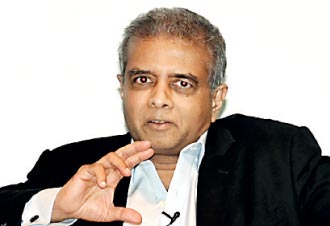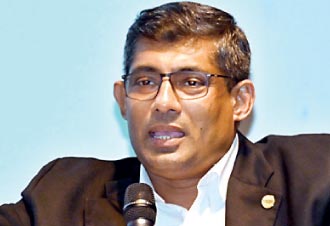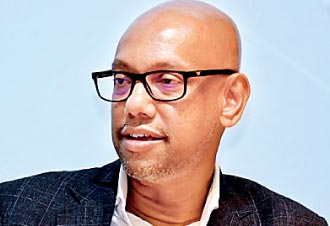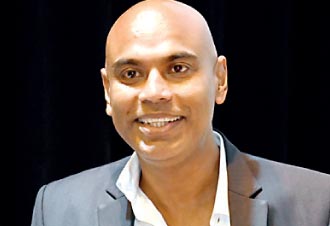Tuesday Feb 24, 2026
Tuesday Feb 24, 2026
Friday, 4 April 2025 01:09 - - {{hitsCtrl.values.hits}}

ICTA Chairman Dr. Hans Wijayasuriya

UCSC Director Dr. Ajantha Athukorala

Creative Software Director Sushena Ranathunga

Moderator Dr. Nirmal de Silva

From left: Moderator Dr. Nirmal de Silva, ICTA Chairman Dr. Hans Wijayasuriya, Creative Software Director Sushena Ranathunga and UCSC Director Dr. Ajantha Athukorala
By DIlrukshi Fernando
Sri Lanka’s IT industry must embrace global trends, adopt an open-source mindset, and leverage its diaspora to achieve the ambitious goal of a $ 5 billion digital industry by 2030, said Chief Advisor to President on Digital Economy Dr. Hans Wijayasuriya.
Speaking at a panel discussion organised by the University of Colombo School of Computing (UCSC) Alumni Association titled “From Strategy to Results: The Execution Roadmap for a $ 5 billion Digital Industry”, Dr. Wijayasuriya underscored the need for Sri Lanka to “punch above its weight” by looking beyond local markets and scaling capabilities for international competitiveness.
The panel discussion, organised with the aim of bridging the gap between strategy and tangible execution of the country’s IT industry expansion was moderated by business leader, lecturer, and corporate trainer, Dr. Nirmal De Silva. The esteemed panellists consisted of Chief Advisor to President on Digital Economy, Dr. Hans Wijayasuriya, UCSC Director Dr. Ajantha Athukorala, and Creative Software Director Sushena Ranatunga.
Dr. Wijayasuriya outlined the high-level plan of the “audacious target” of $ 5 billion given to the industry, to take IT exports from its present $ 1.5 billion to a 3X growth of $ 4.5-plus over five years. Meanwhile the digital economy, which comprises multiple components such as connectivity, ITC, augmented e-commerce platforms, has been tasked with a 5X expansion from $ 3 billion to $ 15 billion, while there is a 2X growth needed from the human capital base from 100,000 to 200,000.
Lessons from India and Singapore
The panel moderator questioned the panellists on the importance of diplomacy in expanding market opportunities, noting that setting international benchmarks and fostering global partnerships will be essential for Sri Lanka’s digital economy to thrive.
When asked about the importance of diplomacy to build capacity and for Market expansion, Dr. Wijayasuriya emphasised on the importance of setting international benchmarks, adding that setting a market share target is essential for Sri Lanka’s digital economy to thrive, on the roadmap to pursue its ambitious industry target.
“It is important to create the demand. We should be careful not to just create the supply. Diplomacy is needed to create demand,” said Dr. Wijayasuriya, highlighting India’s successful strategy of diaspora activation, which has driven substantial demand for its IT industry over the last few decades. He called for Sri Lanka’s diaspora to take on a similar role, channelling opportunities and investment back into the country.
The Chief Advisor to President on Digital Economy pointed to Singapore as a model for Sri Lanka to benchmark against, citing characteristics as similarities between the two nations, while in contrast, Singapore is a strong player in the digital space, with its well-established high-tech economy, digital infrastructure, and strategic use of logistics and technology to drive economic growth.
“When you consider the digital economy as your holy grail, you open yourself up to the world. You become a global competitor. No longer can you be content as an island,” said Dr. Wijesuriya.
Need for a mindset shift in the IT Industry
A key concern raised by all three panellists was the prevailing “silo work” culture within Sri Lanka’s IT sector, both at undergraduate level, and the workforce. Dr. Wijayasuriya emphasised the importance of shifting to an open-source mindset where engineers focus on collaborative development rather than isolated projects.
“It should no longer be a conversation of ‘how big is the system I built?’ Instead, the mindset should shift to a state of federation and collaboration where we as engineers and IT professionals ask: ‘How many others benefited from the systems I built?’” he stated, speaking of a future where open APIs, seamless payment gateways, and thriving industries built on top of a high-functioning digital industry.
UCSC Director Dr. Ajantha Athukorala remarked that the goal for the industry is an opportunity for the education system. “It’s a good time to change the education system, where key elements of our education system have been thrown out because of the race, even at the undergraduate level,” while stressing the importance of being agile to unlearning and re-learn skills, as seen in the startup culture.
Building trust through governance and innovation
Dr. Wijayasuriya also stressed that buyers and investors seek trust in the industry. To remain competitive, Sri Lanka must focus on strengthening data protection laws, governance structures, and compliance with global standards. Innovation was another focal point. “We must keep up with innovation and stay ahead of the curve,” he said, adding that Sri Lanka must prioritise intellectual property (IP) development and high-value production—areas where the country has traditionally been weak. The ultimate winner in such an economy, according to Dr. Wijayasuriya, will be the one with the optimal scalability.
The session moderator Dr. Nirmal De Silva raised the question of capacity building, asking whether the industry should focus on increasing sheer numbers or nurturing individuals who can drive technological innovation.
Echoing the thoughts of Dr. Wijayasuriya was fellow panellist, Creative Software Director Sushena Ranatunga who stated, “We should not only concentrate on capacity. We need people who can do innovative things with technology,” noting that the services sector may not require vast numbers of employees in future, which is a key consideration to shift toward developing more product-based exports from Sri Lanka in the next few years.
Digital public infrastructure as a catalyst for growth
During the discussion, Dr. Wijayasuriya presented the Digital Economy Blueprint, outlining key components of Sri Lanka’s Digital Public Infrastructure (DPI). This includes the Unique Digital Identity (UDI) and the National (Federated) Data Exchange (NDE)—critical frameworks for accelerating digital transformation.
According to Dr. Wijayasuriya, the country’s DPI will be its “inflection point in the J Curve”, which will see initial struggles in digital adoption that will eventually yield exponential growth if the right policies and momentum are sustained.
Education, capacity building, and the role of diplomacy
Panellists also touched on the importance of education reform. UCSC Director Dr. Ajantha Athukorala, highlighted that Sri Lanka’s smaller population requires a niche strategy focused on maintaining high-quality outputs. “We can’t play it safe all the time. Need to take challenges for entrepreneurial skills to come out from education streams itself,” said Dr. Athukorala, urging academics and students to move away from an “exam mentality” and develop agile, entrepreneurial skills.
For Sri Lanka to establish itself as a global digital powerhouse, the country must act decisively. Strengthening governance, fostering innovation, and enhancing collaboration between industries and academia will be crucial in transforming strategic aspirations into tangible results. By leveraging its unique strengths and embracing a forward-thinking approach, Sri Lanka can break past traditional limitations and position itself as a leader in the digital economy. The time for incremental change has passed – bold, coordinated action is now essential to shaping the nation’s digital future.

FT Key Take
Next steps for Sri Lanka to reach the $ 5 billion digital industry target: